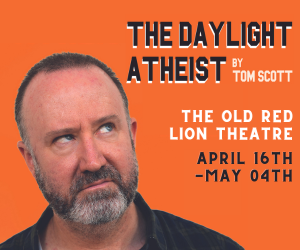UK
theatregoers may be playing catch-up when it comes to playwright
Annie Baker. Whilst her first major work,
There's pleasure to be had from the smallest movements or gestures in a fine script that brings lots of laughs.
But for the most part in The Flick - save for a handful of walkers at the 100 minute interval mark most nights who may have forgotten to pack their Preparation H - Baker's talent for revealing so much by seemingly saying and doing so little, felt exciting and new, and the plaudits were high. So this UK premiere of 2015's John - this time lag perhaps indicative - offers the opportunity for many to find out which elements of this style could be seen as 'Bakeresque' (the allusion to H Pinter is not accidental) as opposed to being a specific treatment to the play in hand.
I don't know if making that clear straight away was the intention of James McDonald's direction as we are immediately let into - and later closed out of - the Gettysburg Bed and Breakfast (that makes your eyes bleed like a Magic Eye picture as it is reveals a floor to ceiling collection of dolls, ornaments, china figurines or what Victoria Wood referred to as 'NickandNacksandBricandBracsandStuff'). But as each of the three acts is marked by the sweet, doddering, mysterious and at times, a little scary landlady Mertis ("but everyone calls me, erm, Kitty", the marvelous Marylouise Burke says with just the tiniest sense of threat) laboriously handling the large heavy pros arch curtains, accepted theatrical pace is immediately discarded in favour of the running of every second of nothingness for the audience to infer, dismiss, question and forget. And it's clear that Baker really has an awful lot of time for an awful lot of time.
The story itself is arguably the least important factor as it is really just a structure on which to display the underlying themes that seem common in many new plays - the battle between independence, loneliness and a desire to be needed. Here young couple Jenny and Elias arrive at the B&B for a couple of nights' break - he with an excitement to see the battle reenactments and her with distorted memories of growing up in a similar B&B with a similar chintziness and similar (the same?) dolls on display. Anneika Rose and Tom Mothersdale give equally strong performances as a couple who are also giving strong performances to salvage a relationship for no real reason other than that's what people must do.
Conversations, arguments and secrets pop up and then disappear again as Kitty - along with her elderly blind friend, Genevieve, listen and advise and reminisce about their own lives and losses. (June Watson's performance as Genevieve is laugh out loud funny... Until you later reflect on the real sadness of the character). But these endless 'reveals' don't impact the events of the time or get followed up, simply being 'plot crumbs', which you can interpret and define at will if you wish. It's little coincidence that there is such similarity between the names Jenny, Genevieve and the mysterious Jenny Room hidden upstairs - is this all just a dream of one of the four? And the eponymous John - the name of a dead husband, an instigator of madness, a controller of God, the cause of a cuckold, or all of the above? Or is it just a coincidence of commonality, because as Genevieve says, 'Everyone knows a John'? There are so many potential clues to a big reveal but really, it's just a playwright's playing. I found myself wondering if this is how things would have been if Jessica Fletcher had ever done an episode based on her holiday to Royston Vasey.
The problem for me here is that these non-reveals are so abundant that it becomes tiresome and feels a bit smug in its knowingnees. A bit like you're being teased for going along with it as opposed to being respected for being a close observer. There's pleasure to be had from the smallest movements or gestures in a fine script that brings lots of laughs. But its run its course by the end of Act Two - with a third hour still to go. The only thing really that develops is the status of Elias' and Jenny's relationship but if you're really caring about that, it's probably due more to the stage of a relationship you're in at the moment. All the other allusions give a sense of fodder for A-Level Theatre Studies essay questions, and frankly I'm a little past caring about exploring "what the playwright meant by..."
It may seem churlish for such attention to be paid to the impact of the running time. But when the narrative itself doesn't demand this time for detail to play out, it can feel - as it does here - an indulgent gimmick. That said, duration will always polarise audiences - much in the way that some may think a corked wine tastes okay if told the high cost; such is the assumed sign of quality. There's nothing hugely terrible if this is a planned signifier for all of Baker's work - a smart move to be known for anything consistent as a playwright, and the 'Pinter Pause' never did any harm (though I haven't seen any new writing from him in quite a while now....) I just hope that we avoid the potential for such a short hand signifier to become common and dread the idea of returning to the faux intellectual snobbery of the terrible Shakespeare, the over-priced exclusivity of opera, and the middle class touts' cries of "Never mind the quality, feel the width" outside the theatre.









